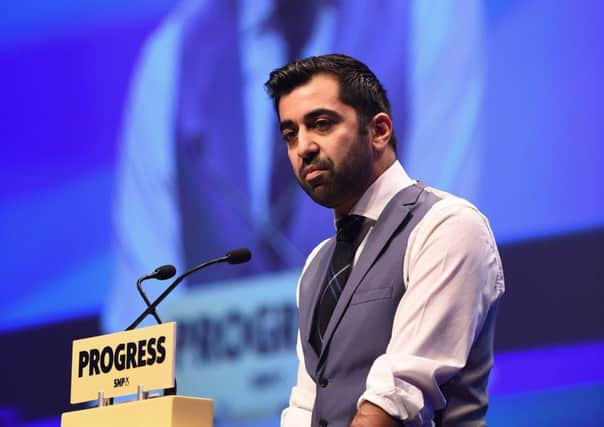Martyn McLaughlin: Diversity training doesn't cure racism


It is difficult to know precisely when Jim Dempster ought to have realised that it is not appropriate for an elected representative to give voice to casual racism, but a potted history of his political career would indicate that he has had plenty of opportunities to enjoy his own wee 20-watt eureka moment.
Perhaps it was when he was first successfully stood for election in his hometown of Sanquhar in 1999, or when he was reelected to the same office four years later. It may be that the realisation should finally have dawned on him in 2007, when ward changes meant that he was chosen as one of the first councillors for Upper Nithsdale. Or maybe we should just concede that even self-evident truths come grudgingly to slow learners. The penny should have dropped when he was reelected to Dumfries and Galloway Council in 2012. No? Okay, how about 2017?
Advertisement
Hide AdAdvertisement
Hide AdWhat about when he was chosen as a member of the local authority’s communities committee? Or its children, young people and lifelong learning committee? Or when he became a member of a local educational trust? Or last March, when he and his colleagues sat down to discuss the council’s equalities action plan progress report? By now, you are probably noticing in a trend. Over the course of a near two-decade career in politics, you would think it would become fairly clear at a relatively early juncture that there is no place for racist slurs. Sadly, it required a sordid little scandal for that point to hit home to Mr Dempster.
Last week, this veteran Labour councillor and former newsagent was roundly condemned for his remarks about Humza Yousaf, Scotland’s transport minister. The 71-year-old told transport officials that “no one would have seen [Yousaf] under his burqa”.
The predictable apology emerged soon afterwards, but Mr Yousaf, to his credit, refused to accept it. Instead, he made clear his exasperation – not only with the councillor’s remarks, but the manner in which they were made.
“This kind of slur, which is so brazen, from a senior elected councillor in front of my transport officials – knowing it would easily come to me – and in front of members of the public, just goes to show how far we’ve got to go, and just how emboldened some feel about making Islamaphobic remarks,” he told the BBC.
It is an acute observation. Even if such vile comments can be conceived of, the presence of a crowd, and a public crowd at that, ought to be a bulwark against them being expressed out loud. That it did not throws up some deeply disconcerting questions of how ingrained such prejudice is in our politics.
Mr Yousaf also seized on the programme of diversity training that Mr Dempster is to embark on as a consequence of his remarks, pointing out that such a course “shouldn’t be seen as a punishment”.
It is a point political parties would do well to consider, especially Scottish Labour. The unconscionable remarks made by Mr Dempster, who has been suspended by his party pending an investigation, is the third such row to engulf it since the end of January.
It follows the alleged remarks made by Davie McLachlan, leader of the Labour group on South Lanarkshire Council, about Anas Sarwar MSP, and the comments by Hugh Gaffney MP about the LGBT community and Chinese people, made at a Burns supper in Edinburgh.
Advertisement
Hide AdAdvertisement
Hide AdIn two of those cases, diversity training has been part of the aftermath’s narrative; Mr Gaffney has been ordered to undergo such a programme, while Mr Dempster volunteered to do so.
The question of who was nudged and who acted of their own volition is entirely irrelevant. What matters is the way the concept of diversity training is being wrongly viewed as part of a disciplinary process.
If you are expecting an imminent tirade against diversity training, think again. For all that such processes are lazily dismissed as the product of political correctness gone mad, they can and do fulfil an important purpose.
For starters, they allow people to identify assumptions and unconscious bias, and are particularly useful for political decision makers who can be enlightened as to the equality impact of certain policies. In short, it is good practice.
But the notion that diversity training can act as a quickfire corrective to the attitudes and remarks of individuals like Mr Dempster and Mr Gaffney is frankly laughable.
As elected representatives, they have will been made well aware, time and again, of the importance of equality and respect. How, if at all, will their current programme of education differ from the equality guidelines laid down by their party and employers? Scottish Labour has not made that clear. It should.
Both representatives know fine well that what they said was beyond the pale, even if they were unable to stay silent. In isolation, no amount of workshops or roleplaying will fundamentally change their views, but still there is an implicit assumption being made that their mere attendance at diversity awareness sessions will allow them to make amends. It is an absurd idea. Can someone like Mr Dempster change? Of course, anyone can, and we should hope that being shamed in public will hasten that process. But those who have proven themselves capable of making racist smears while in elected positions should not be afforded the luxury of holding on to their office while they undergo rehabilitation.
